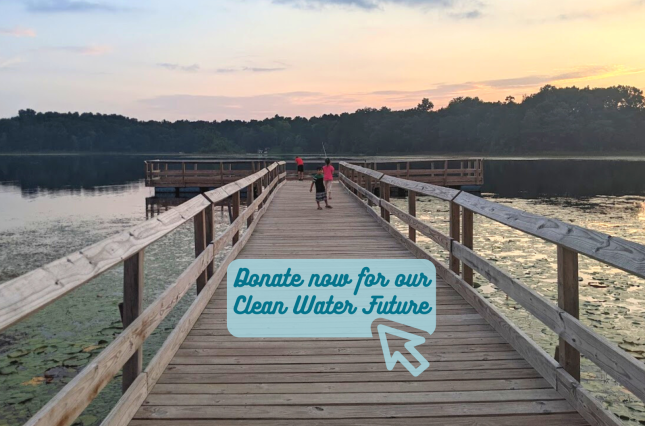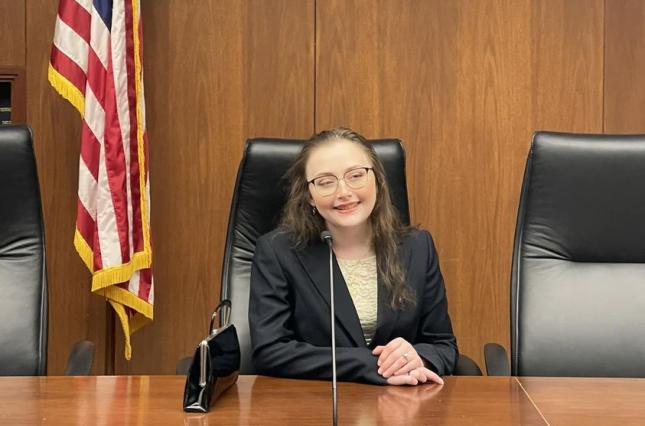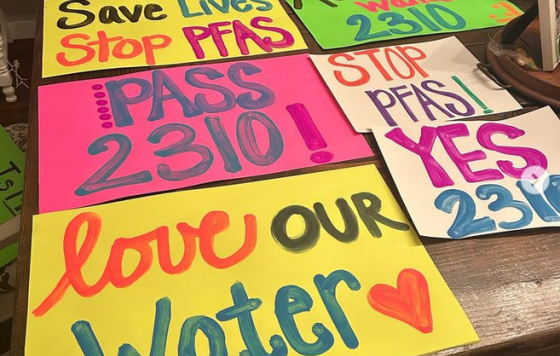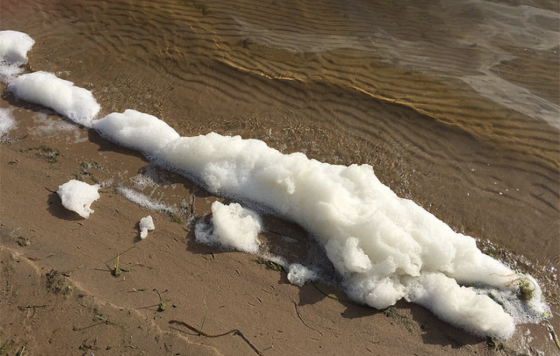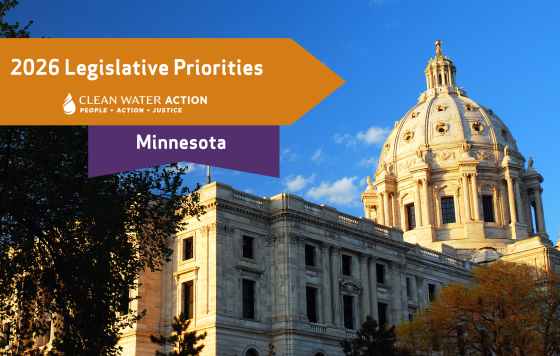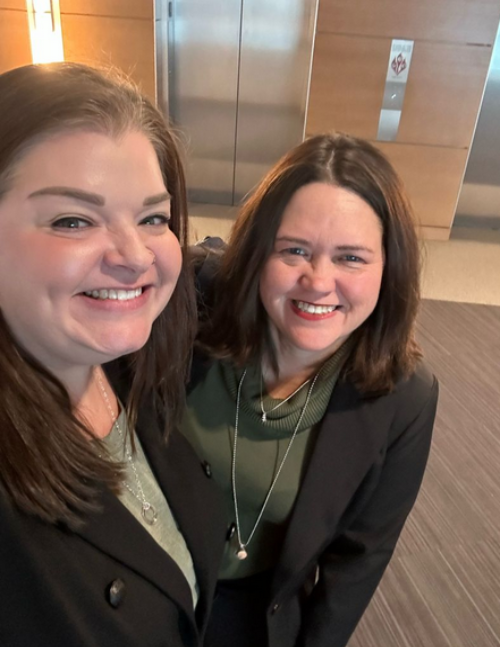
Passing the most comprehensive per-and polyfluoroalkyl substances (PFAS) law in the world started with a simple introduction. More than a decade ago, Republican Jennifer DeJournett and Democrat Avonna Starck were introduced by their mutual friend and mentor, Nancy Bocskor. Bocskor, an adjunct professor at the Graduate School of Political Management at George Washington University, saw that even though the two didn’t agree politically they agreed on the role of politics in bettering people’s lives.
Starck and DeJournett became friends and a political alliance was quickly forged. When they hit glass ceilings, as women frequently do, they encouraged each other to shatter it. Both were elected to local, non-partisan offices. As they grew to become respected political operatives from opposing political parties they remained each other’s biggest champions.
This friendship would change the way the chemical industry operates globally.
In 2023, DeJournett was coming off a heartbreakingly close election loss as a campaign manager and Starck was newly hired as the State Director for Clean Water Action inMinnesota, a role utilizing her campaign, lobbying, advocacy, fundraising, and leadership experience.
A legislative juggernaut was launched with a simple phone call.
Starck called DeJournett and asked for her help to pass legislation addressing PFAS contamination in Minnesota’s water. PFAS are known as “forever chemicals” due to bioaccumulation - they do not break down over time - and are linked to a variety of debilitating and fatal health outcomes including thyroid conditions, obesity, preeclampsia, low birth weight in infants, learning disabilities in children, cancer, and more. PFAS does not discriminate regarding who gets sick, but it does make a large profit for industry who have deep pockets to fight any attempt to legislate regulations. PFAS were developed in Minnesota and now — driven by a cross-aisle friendship — they’re ending in Minnesota.
The first PFAS chemicals were developed in the 1940s by 3M. Internal industry documents show that the toxic effects of PFAS were known almost immediately. Despite this, 3M dumped PFAS chemicals in the East Metro area throughout the 1970s and continued to mismanage their waste throughout the 1990s and beyond. The contamination covered more than 150 square miles including the drinking water source for more than 140,000 people, resulting in a devastating cancer cluster, particularly in the area around Tartan High School. This environmental catastrophe was the catalyst that inspired the community to demand action addressing these chemicals used in the products we use every day. It also drew global attention in 2018 with a $850M lawsuit brought against 3M by then Minnesota Attorney General Lori Swanson.
What would be known as Amara’s Law mandated disclosure of PFAS in products to the Minnesota Pollution Control Agency (MPCA), banned PFAS in 11 consumer item categories sold in Minnesota, and created a plan to phase out PFAS in firefighting foam. It was developed by Clean Water Action Minnesota, Representative Jeff Brand, and stakeholders months before it was introduced. It made sense for Minnesota from an environmental, health, and fiscal standpoint: a MPCA report found that “removing and destroying PFAS from water and biosolids leaving Minnesota’s wastewater treatment facilities could cost between $14 billion and $28 billion over 20 years.”
Because of the increasingly partisan nature of environmental policy work, success meant building a strong coalition of individuals and organizations while drawing on the strength of grassroots advocates and families who were impacted. This coalition included a 20 year old woman named Amara Strande.
Andrea Lovoll, the legislative director for the Minnesota Center for Environmental Advocacy (MCEA), reached out to ask if she could assist. The three began to refer to themselves as the “Momma Bears” determined to amplify the voice of Amara Strande who was diagnosed with a rare form of liver cancer in 2017 at just 15 years old.
Strande grew up in Oakdale, in the middle of the 3M plume, and had dreams of becoming a professional musician. After Strande’s diagnosis, she underwent more than two dozen surgeries in an attempt to halt its deadly spread. Three days before the first floor vote on PFAS Prevention Package - and two days before her 21st birthday - Amara Strande died.
Strande was an enthusiastic, knowledgeable, and passionate spokesperson against cancer linked to an unregulated industry. Not yet 21, she knew she put a face on the PFAS issue, both in life with a disease linked to unchecked chemical dumping, and in death. She was always eager and ready to testify at the Capitol, despite serious illness and mobility issues. Strande became hard for anyone to ignore.
In her initial meetings with the Strande family, Starck found they were eager to share their years-long journey so Minnesotans would know about the heartbreaking, deadly effects of PFAS. They wanted legislators to be educated about the catastrophic financial, emotional, and health impacts of the cancer that would ultimately take their daughter’s life.
It became clear that partisan rhetoric masked an important insight: environmental issues are NOT partisan issues. Instead, they are core values for the health and safety of Minnesota families. Focusing the conversation on the impact created a path forward for passing the legislation that addressed the PFAS crisis – but only if the conversation could circumvent partisan hyperbole.
Under the leadership of Clean Water Action, a committed team of volunteers and advocates met with lawmakers on both sides of the aisle to learn about their views regarding the legislation, answered questions, and addressed concerns. It also meant having tough conversations internally about enacting groundbreaking legislation in a responsible, thoughtful way that considered the short- and long-term impacts of implementation.
Lawmakers of all party affiliations were hearing from their constituents, in part because of the grassroots organizing by Clean Water Action Minnesota. The demand was loud and clear: take action now to ensure the health and safety of Minnesota’s water supply for all families.
As grassroots efforts began to build successful relationships with lawmakers, and the legislation advanced toward becoming law, out-of-state industry lobbyists rushed into Minnesota threatening elected officials who would be facing upcoming election challenges, and relying on biased information favoring big business interests, in an attempt to kill the bill. At a time where legislation affecting all Minnesotans is discussed in smoky back rooms and in private meetings in dark corners or hallways, the women said NO. They demanded work be done in an open and transparent way so they could create a model for other states. Those around the globe affected by PFAS took notes for their own fight to end the sale and use of PFAS. Industry’s efforts were for naught in large part because of the coalition built between Starck and Dejournett and the strength of Amara Strande.
This fight was nearly over before they ever even landed in Minnesota.
Working long hours across the aisle was critical if the bill was to succeed. Both Starck and Dejournett built their careers focused on success within one party. They knew they each had to build stronger bipartisan relationships to create a healthier future for Minnesota. The women, despite the polarization in today’s political climate, knew that to center families and not partisanship they must have an open door, an open mind, and work with everyone regardless of ideology.
After all, the toxic water that is believed to take Amara’s life did not care which political party she belonged to or which zip code she or her family lived in.
Trust is the key to building a political alliance which crosses partisan lines and collaborates on complicated, groundbreaking legislation. Without the fundamentals of trust, one cannot take calculated risks. Political operatives and legislators working across partisan lines was once commonplace, but in today’s hyper-partisan world it has become virtually nonexistent. Vilifying others has led to a society unable to work together on common goals, and where media coverage and “likes” on social media posts override the need to simply do the right thing.
Because of the trust Starck and Dejournett shared, they were able to lend credibility to each other and the legislation, opening doors normally closed to them, and allowing historic environmental legislation to pass.
The question we must ponder is why does this not happen more often? Why have legislatures become a place of grandstanding and self-promotion rather than a place of working for the people? How have the two sides become so polarized that being reasonable is considered treasonous within the party structures? And why can’t we see that the vast majority of the people they represent want all sides to work together so the government can function and do its job?
As is often the case, the PFAS language was folded into a larger “omnibus” bill in conference committee at the end of session. Many Republicans shared they would have liked to vote for the PFAS legislation as a stand-alone bill, but ultimately decided there were too many other issues with the larger bill they didn’t like and voted no. Despite the reservations regarding the other items included in the omnibus bill, three Senate Republicans voted yes on the PFAS ban prior to the conference committee.
Passing the PFAS Prevention Package was no easy feat. The key was threefold - dedicated advocates coming together to talk about the human toll of doing nothing, a deep trust between two women who otherwise work on opposite sides of the aisle, and Amara Strande’s voice. We all deserve safe and clean water, regardless of which party is in the majority or the zip code we live in. We all want legislators who support bills promoting the health and safety of our communities.
On the heels of another recent settlement with 3M for $10.5 billion to clean up drinking water, we are once again reminded that this problem of unregulated industry overreach is not going away anytime soon. It is time to protect the future for all of our neighbors, regardless of whether they grow up to be a Democrat or Republican or something else.
It is time for people to trust one another again and we can start in the spaces where we all agree. Only through trust, taking time to listen, and working collaboratively can we tackle the big issues of today for the benefit of all our futures.
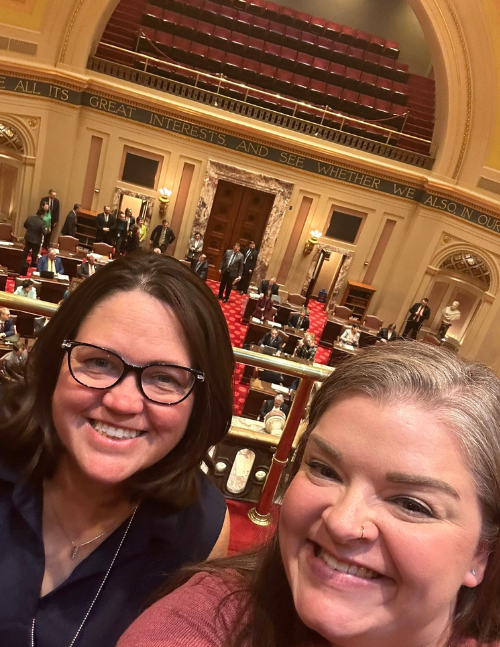
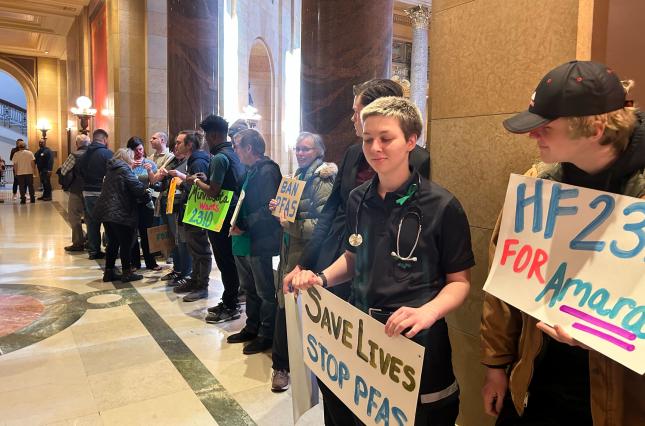
Minnesota Passes the Nation’s Strongest PFAS Regulations
PFAS Victory in Minnesota - Thanks To Your Support!
Taking on toxic PFAS from MN to NJ
"Through no fault of my own, I was exposed to these toxic chemicals. And as a result, I will die with this cancer."
